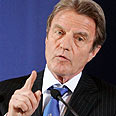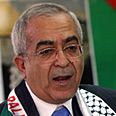

A Palestinian business conference has raised investments for projects worth $1.4 billion, including in housing, high-tech and telecommunications, the Palestinian prime minister said Friday.
The investments could create as many as 35,000 jobs, Prime Minister Salam Fayyad said at the end of the three-day conference, which drew more than 500 foreign investors, many from the Arab world, along with hundreds more from the Palestinian territories.
Fayyad declared the conference a success. "This is the start of moving the wheel of the economy, with a view toward the leading role of the private sector," said Fayyad, an economist. However, critics say investment remains risky because continued Israeli movement restrictions and an uncertain political climate.
The closing session was attended by French Foreign Minister Bernard Kouchner who criticized Israel's network of roadblocks and checkpoints, seen as a key impediment to the recovery of the Palestinian economy. Israel says it cannot move faster in easing restrictions because Palestinian militants still pose a threat.
"The restrictions on access and mobility are still significant," Kouchner said. "They have not yet been alleviated as they should have. Israel should and Israel can exert more efforts in this regard without endangering its security."
More than $500 million in real estate
Kouchner also took Israel to task for ongoing construction in Israeli settlements.
"Nothing justifies the settlement expansion, which constitutes an impediment to peace, as well as an obstacle obstructing the development of the Palestinian economy," he said.
Israeli government spokesman Mark Regev said construction continues only in Jewish neighborhoods of east Jerusalem, which Israel does not consider settlements, and inside large West Bank settlement blocs that Israel intends to retain in any final peace accord.
The Palestinians and the international community do not recognize Israel's 1967 annexation of east Jerusalem, which the Palestinians want as capital of a future state.
The Palestinians also demand sovereignty over the entire West Bank, though negotiators have discussed swapping the land where major settlement blocs stand in exchange for an equal amount of Israeli territory.
In detailing the investment deals, Fayyad said more than $500 million is in real estate, $65 million in high-teach and $650 million in telecommunications.
Some of the deals, including for establishing a second mobile phone provider, have been in the works for a long time.















